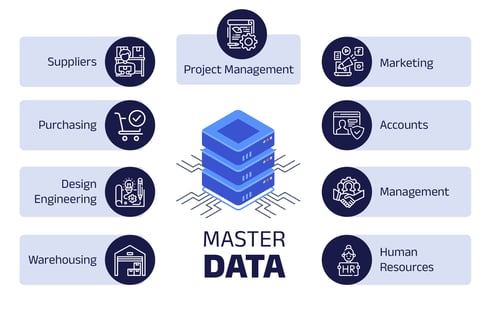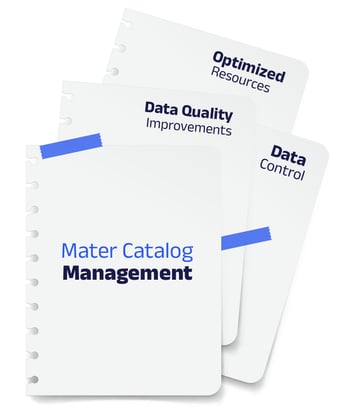Your business may need Master Catalog Management. Learn about it here.
Today, one of the biggest priorities for businesses is ensuring their optimal development by having organized data. Fortunately, it is becoming a trend to migrate processes to a digital environment, where different tools can be used to have well-structured information and enhance the evolution of companies. Even though it may be intuitive for some, several organizations fail to take the next step in managing their operations: this is where master catalog management comes into play.
Let’s define the terms: a data catalog is a compilation of prioritized data that provides an overview of information for any company. According to Talend, “they also automate metadata management and make it collaborative”, which means it is a synergic tool for providing a context of the current state of the business. In this sense, a master data catalog serves the same purpose, except it contains the most critical data for the organization, which may include suppliers, employees, and products, among others. To grasp the importance of this, let’s find out what types of master data there are, what challenges this helps to overcome, how it is a straight pathway to achieve a BI strategy, and how you can begin managing your master catalogs.
Types of master data
Businesses generate great amounts of data within each area every day, data that is often indistinctly stored or poorly managed from the moment it's created. It is of the utmost importance for companies to distinguish the relevance of each piece of information, which is why there is a classification of different types of master data. There are, at least, 4 categories:
Parties
These include the individuals with assigned or assumed roles, such as customers, employees, and suppliers, among others including part-taking organizations. These are considered to be one of the most important pieces of information for any company, since they are the people who drive most of the business’ operations, help make decisions and provide valuable insights for growth and for identifying pain points to tackle.
Products
This is not referencing the services or products offered by the company, but rather the equipment, material, media, and items related to the business activities for day-to-day operations. It’s important to keep track of them since they are critical tools to get the job done, which are commonly used by some of the parties mentioned above.
Financial
Keeping track of financial activities and structures is primordial to understanding how the company is making the investments effective, which needs are ahead, and what can be done to improve assets, accounts, and documents related to the business funding. Without a record of financial activities, organizations are most likely to fail to develop.
Locations
The location refers to the place which acts as a center for gathering staff members to organize and store information regarding the organization. This refers to the physical locations where the business activities are held or where the main administration stores equipment and primordial documents, and it is critical to keep track of them due to the many branches, facilities, stores, and ventures that might emerge during the enterprise development.
 Different types of master data
Different types of master data
Although different authors and businesses may have different classifications of master data, it can be grouped into the aforementioned categories, due to the great importance they hold inside companies.
The next step is to determine why master data is so important for business control and development. What benefits can it bring to classify and prioritize said information? Let’s find out!
What can you solve with Master Catalog Management?
Plenty of challenges are met when dealing with growth during business development, which usually involves the decisions of administrators and stakeholders to draw the pathway to follow for the future of the company. In this sense, having a well-managed master catalog will help solve most of the following issues:
Improve your Data Quality
When created and stored, information can undergo undesired transformations if not controlled from the beginning. Some of the issues found can be data redundancy, in which data gets split multiple times causing uncertainty about what is true and what is not. Data inconsistency is also common, thanks to unstructured and unprioritized data, which leads to duplications, missing fields, and scrambled information, among other issues in day-to-day operations.
With a well-implemented master catalog management system, you can avoid these issues from the beginning: thanks to the good usage data can have with this process, it becomes immune to any inconsistency that may appear, making it significantly easier to query and manage.
Gain greater control over data
Having scattered information throughout different sources results in wasting time and resources to find and use data the way it is needed, which ultimately leads to an uncontrollable growth of data silos and data swamps, thus making the information hard to take advantage of, as well as almost impossible to keep track of.
By optimizing and tracking the evolution of your resources through master catalog management, you can gain complete control over your data, thus making it available to visualize, query, and make use of by reducing searching and cleaning times significantly.
Optimize your resources
According to Oracle, “the concept of a data catalog has become popular because of the increasingly large amounts of data that now have to be managed and accessed.” When companies expand and grow, their processes need to adapt to the new needs of the company to keep on functioning. This means they need to optimize not only the way they manage their processes but also their data.
One way to optimize the use of their master data is through a catalog management system. In their article, Oracle points out that a good data catalog should offer and facilitate searching and discovering, harvesting and curating metadata, automation of processes through data intelligence, and give enterprise-class capabilities to businesses.

Benefits of applying master catalog management
In this sense, master catalog management not only helps you gather the most critical information about your company but also helps keep track and control over your data to visualize and query if it is of optimal quality to use. These improvements can, consequently, lead to other impactful benefits for businesses, such as achieving Business Intelligence.
If you feel ready to start a master catalog management system, you can take the first step with us: talk to one of our data experts to guide you through the solutions that best suit your business needs to achieve a successful master catalog management.
Catalog Management: a pathway to BI
To understand how these two are related, let’s start by defining what Business Intelligence is. Better known as BI, it “ is a technology-driven process for analyzing data and delivering actionable information”, according to TechTarget. It is a set of processes to lead businesses into making better-informed decisions, which should be based on valuable metadata. This helps companies make great use of their data from the moment it gets created up until its final usage, through optimized tools and techniques to reach the ultimate goals.
Business Intelligence takes on the challenge of transforming data into valuable information through deep analysis and understanding of the use it will have for the company: it starts from the moment data gets created, registered, or extracted, to then undergo a deep analysis and cleaning process with technology such as machine learning or artificial intelligence, to finally reach the last stage of visualization or usage, depending on the objective at the time.
How are master catalogs related to BI? When data starts getting prioritized, it needs the help of specialized techniques to achieve accuracy for its final use. In this sense, the more techniques are applied to select, extract, clean, improve and use master data, the more a BI process is closer to being achieved. They are closely related thanks to the process and data optimization they help build.
Simply put, one direct consequence of managing master data and prioritizing it into master catalogs is being one step closer to reaching Business Intelligence inside businesses. It needs more than data optimization to be reached, but it is a big step taken towards achieving it.
How are catalog management and Data Governance related?
Another advantage of master catalog management is that it is also related to other processes inside businesses, in which it serves as a gear to keep on developing various steps prior to BI. We are talking about Data Governance and its direct relationship with catalog management. To better understand their involvement, it is necessary to point out that Data Governance is a series of processes that help to assign roles, evaluate, plan and monitor activities related to data, to achieve a definition of rules and practices to keep business processes running smoothly.
Thanks to Data Governance, companies can establish a solid strategy to perform, ensure compliance with policies and rules, and standardize and control the quality and processes held throughout the whole organization, which includes partnerships and stakeholders.
The way they act intertwined is, by specifying and determining the data to be prioritized and cataloged, it is necessary to have established rules and practices that will dictate what and how data will be handled. Through the regulations set via Data Governance, any company can ensure the correct adjudication of the roles and responsibilities of the staff member that will channel the data to be managed. Master catalogs are created thanks to the determination of which data is critical for the business, a matter that can be established through a governance process. In this sense, through the improvement of processes, data can be prioritized and selected to be a part of the master catalogs of the company.
What is the first step to start a master catalog management?
During any stage of business development, it is important to consider how internal processes will evolve in order to apply the strategy needed. With that being said, it is important to assess if your data has an optimal maturity level to undertake a process like master catalog management. This is why we recommend taking this assessment to have a quick overview of your data.
And, because this is a process that needs to be handled by experts in the matter, with the help of our team, you can discover what your business really needs. We can help you with the following solutions:
- Data Integration. With our team of Data Ops, we carry out Oracle Cloud Extractions, data transformation, and cloud migration, among others.
- Catalog Management. Through process mapping, cleaning, and optimization, we centralize your information, thus improving master catalog management.
- Advanced Analytics. We achieve a robust analysis of all data through statistical and prediction methods, such as machine learning and predictive analytical models.
- Data Governance. Reach high-value access control of information with our permissions to control access to data without losing visibility.
- Big Data Management. Through information modeling, achieve optimal data quality and carry out data monetization.
Thanks to our Arkon Data platform, we allow companies to harness their data and business processes through robust infrastructure and user-friendly design. With our data management features, you’ll be able to integrate and manage all your information with the help of our tailored solutions and our team of experts, all in one place.
Now that you know the importance of implementing a master catalog management system, are you ready to take the next step in enhancing your data? Get in touch with our teams of experts, who will take your call to begin a journey of raising organizational intelligence with Arkon Data.
.jpg)
Ana Lucía Gutiérrez Tapia
Ana Gutiérrez is a passionate copywriter and content creator at Arkon Data. When she is not diving into data-related themes like ETL, data management, cloud migration, Data Governance, and Business Intelligence (among many others), you can find her illustrating her nightmares and singing metal and classical music while petting her cat.



